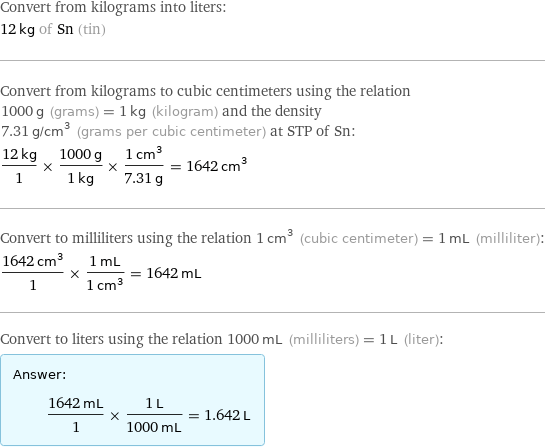Input interpretation

convert 12 kg of tin (chemical element) to volume
Results

1.642 L (liters)
Possible intermediate steps

Convert from kilograms into liters: 12 kg of Sn (tin) Convert from kilograms to cubic centimeters using the relation 1000 g (grams) = 1 kg (kilogram) and the density 7.31 g/cm^3 (grams per cubic centimeter) at STP of Sn: (12 kg)/1 × (1000 g)/(1 kg) × (1 cm^3)/(7.31 g) = 1642 cm^3 Convert to milliliters using the relation 1 cm^3 (cubic centimeter) = 1 mL (milliliter): (1642 cm^3)/1 × (1 mL)/(1 cm^3) = 1642 mL Convert to liters using the relation 1000 mL (milliliters) = 1 L (liter): Answer: | | (1642 mL)/1 × (1 L)/(1000 mL) = 1.642 L
Unit conversions

0.001642 m^3 (cubic meters)

1642 cm^3 (cubic centimeters)

55.51 fl oz (fluid ounces)

3.469 pints

1.735 quarts

0.4337 gallons

0.05797 ft^3 (cubic feet)

100.2 in^3 (cubic inches)
Comparisons as volume

≈ ( 0.073 ≈ 1/14 ) × volume of one mole of ideal gas at 273.15 K and 101.325 kPa ( 0.02241 m^3 )

≈ 0.3 × volume of blood in a typical human ( ≈ 5 L )

≈ 3 × volume of a typical human breath ( ≈ 0.5 L )
Comparisons as volume of food or beverage

≈ 0.53 × volume of a US size 10 can ( 105 fl oz )

≈ 0.991 × volume of a US size 5 can ( 7 cups )

≈ 1.7 × volume of a US size 3 can ( 4 cups )
Interpretations

volume

volume of food or beverage

capacity

section modulus
Basic unit dimensions
![[length]^3](../image_source/a23941782d09f0592209076038de112e.png)
[length]^3
Corresponding quantities

Radius r of a sphere from V = 4πr^3/3: | 73 mm (millimeters) | 0.24 feet | 2.9 inches

Edge length a of a cube from V = a^3: | 12 cm (centimeters) | 0.39 feet | 4.6 inches

Mass m of water from m = ρ_(H_2O)V: | 1.6 kg (kilograms) | 3.6 lb (pounds) | (assuming maximum water density ≈ 1000 kg/m^3)

Molecule number N of water from N = ρ_(H_2O)V/m_(H_2O): | 5.487×10^25 molecules | (assuming maximum water density ≈ 1000 kg/m^3) | (assuming molecular mass of water ≈ 18.02 u)